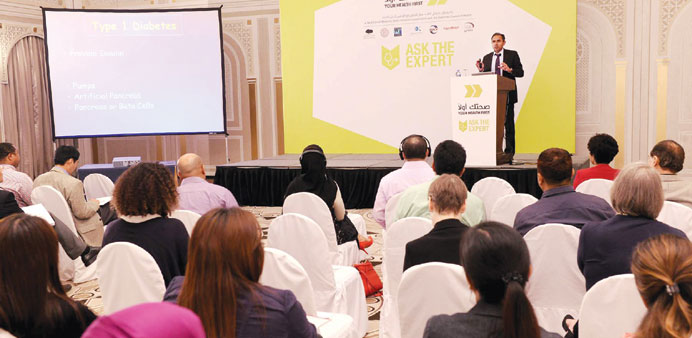Various new drugs and procedures, which can actually cure diabetes in some cases, were discussed at the latest instalment of Weill Cornell Medicine-Qatar’s (WCM-Q) ‘Ask the Expert’ series.
Dr Rayaz Malik, professor of medicine at WCM-Q, said, “Many people still believe that diabetes is incurable and that its progress can only be managed. That may have been the case 10 years ago but it is no longer true today. Admittedly, there is no magic bullet but there are a range of therapies which can offer major improvements and in some cases cure the disease completely.”
Dr Malik explained that there are two major forms of diabetes: type 1 which cannot be prevented, and type 2 which is linked to lifestyle factors like obesity, diet and a lack of exercise and accounts for 90% of all cases worldwide. “But people should also be aware that there are also some rare genetic variants of the disease that respond very well to medication.”
For type 1 diabetes, Dr Malik said many people spend money on stem cell therapies but as yet these have not been successful. However, islet cell transplantation, where healthy pancreatic insulin-producing cells are transplanted into the liver of the diabetic patient, has proven to be an effective treatment. A more drastic solution is a whole pancreas transplant, which cures type 1 diabetes, but requires life-long immunosuppressant therapy.
Type 2 diabetes, being related to obesity, presents different challenges. The most important action that a patient can take is firstly to eat healthily, exercise regularly and lose weight. But there are also medical interventions. Two new classes of drug have been developed that help to address the underlying problem of weight and they could potentially stop a pre-diabetic individual from developing full-blown diabetes. They even have the potential to reverse type 2 diabetes completely.
Dr Malik said the real hope for a cure for type 2 diabetes, though, is bariatric surgery. Although invasive, it results in remission from diabetes in 70% of patients.
But although medicine has advanced and treatments are constantly improving, the most important thing to remember is to take responsibility for your own body and look after it. Reducing your consumption of refined sugar and increasing the amount of fruit and vegetables you eat, in conjunction with 30 minutes of moderate exercise each day, will help you to avoid developing type 2 diabetes, meaning you won’t have to visit a doctor at all.

Dr Rayaz Malik delivering a lecture.
